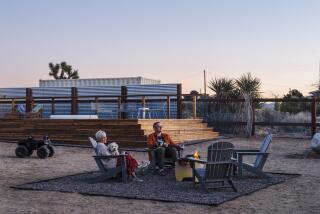To survive, children of Aaron coming of age : Isolationist sect finds it must let a little of the world seep into its commune to keep it alive.
- Share via
ESKDALE, Utah — God chose this bleak spot to test the sons and daughters of Aaron.
He gave them strict laws and hard work. He gave them strength to endure summer’s terrible heat and winter’s cruel cold.
And after 40 years in Utah’s Sinai, the 130 residents of the Eskdale Christian commune pray he will give them strength to change their way of life in order to save it.
Pioneers from the Order of Aaron hoped to create a better world in the desolate Snake Valley on the Utah-Nevada border. Their chosen land far from the distractions of modern life was a 4,800-acre homestead six miles north of U.S. 50, the ribbon of asphalt dubbed “America’s Loneliest Highway.”
Life was hard in the rough-hewn shacks that lacked plumbing and electricity. As they coaxed farmland from the desert, all property was pooled, consecrated to God for communal use.
“It was a test of faith,” said Robert Conrad, who in 1958 moved to Eskdale with his wife and children. “People had a different view than they do now.”
Each family had a home, but schoolchildren shared a dormitory and all meals were eaten in a commune dining hall.
The evils of the world were held at arm’s length: no alcohol, caffeine, tobacco, dancing, television, rock ‘n’ roll or team sports.
In rare visits to towns 100 miles over the horizon, the Aaronites stood out: the men in blue slacks and shirts with “Aaron” embroidered in gold over the pocket; women in blue and white dresses with “Levi” embroidered on their small, white bonnets.
As the commune matured, the land became green with alfalfa and corn. Culture also flourished. Classical music and education are revered by the Aaronites, who formed a 36-member orchestra and two choirs. The commune’s Montessori, elementary and high schools, where most teachers hold doctorates, became among the best in the state.
But the commune has fallen on hard times. The 200-head dairy, once the mainstay of its economy, has dwindled to just 50 cows. There are too few adults to do the milking and teach school.
The children are encouraged to leave for college, but now only 1 in 10 comes home again.
Fearing Eskdale may become another failed Utopia, the Aaronites are cautiously embracing the world they left behind.
“People realize you’ve got to have more enticement than just rules and labor,” said Eunice Cole, who joined the commune three years ago with her husband and three children.
Once, ample enticement came from Dr. Maurice Lerrie Glendenning, a charismatic chiropractor who wandered the West before settling in Utah in 1929.
Glendenning thought himself a direct descendant of the Old Testament priests Aaron and Levi. He spoke of out-of-body experiences, miracles and visits by angels who dictated his hand-written scripture.
Glendenning died in 1969, and Conrad now tends a flock of about 250, split between the commune and modest churches in Salt Lake City and Provo.
Conrad hopes to maintain the order’s spiritual underpinnings while shedding the harsh lifestyle that he attributes more to force of habit and isolation than to religious belief.
The dormitory has closed, and the dress code has been relaxed. Children may watch sports on television--although entertainment programs are still forbidden--and may listen to any music their parents approve.
Last fall, the commune even started a basketball team, the Christian Soldiers, to compete with distant public schools.
“It’s a lot better than it was before,” said 15-year-old Allen Sturlin, pausing between shots at the commune’s new basketball court. “Before, there wasn’t much to do. It wasn’t much fun.”
But there is risk in Eskdale’s reformation.
Conrad sighs heavily when told that Sturlin’s musical tastes run to rap.
“It’s the world seeping in,” he said. “The culture around us now is very permissive and seductive. The older people feel the fear of being washed away.”
All reforms are hotly debated by the commune. Nothing is done without consensus, but some members seem resigned to unsettling alteration in their simple routine.
“Times change,” said Karma Childs, the first woman on the commune council.
But the same faith that brought the Aaronites into the desert will see them through the next test of their community, she said.
“We talk about it, and we pray, and we find our way.”
More to Read
Sign up for Essential California
The most important California stories and recommendations in your inbox every morning.
You may occasionally receive promotional content from the Los Angeles Times.













